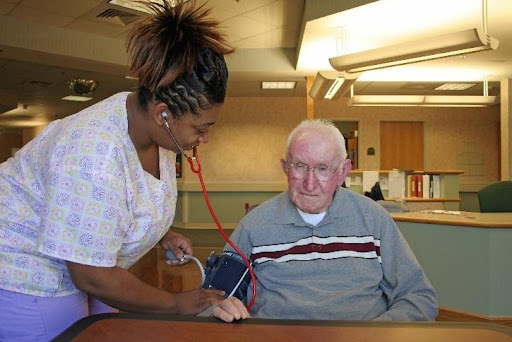The job duties of a CNA vary depending on where you work, but all CNAs play an important role in the lives of the people they help. That’s because they work closely with their patients. In some cases, a patient may spend more time with their CNAs than they will with any other healthcare team member! A CNA may help them dress, bathe, eat, and move around. They may also help keep their space clean and sanitary. Overall, CNA job duties are important and critical work in the world of healthcare. Are you curious about what the job duties for a CNA look like in a typical day? Here are five things you can expect if you decide to pursue a CNA career.
Learn more about Training Directs Nurse aide program!
1. Report to LPNs, RNs and Physicians
Certified nursing assistants work in various settings. This includes hospitals, assisted living communities, nursing homes, doctor’s offices and more. No matter where you work, you’ll report to an LPN, an RN, a doctor, or some combination of the three. You’ll need to track and report any changes in a patient’s condition so the healthcare team can make good decisions on their care, so good communication skills are essential for completing your job duties as a CNA.
Throughout your day, a nurse or doctor may call for changes in a patient’s care plan. This might include increasing a medication’s dosage or watching a specific vital sign. Because of this, having strong listening skills is another important skill for a CNA.
2. Assist patients with mobility
One of the biggest job duties of a CNA is helping patients with mobility. This may include:
- Helping patients transfer to different places, like from a bed to a wheelchair
- Walking short distances with patients and providing physical support and help
- Working with patients on motion exercises or physical therapy
- Helping patients learn how to use a walker, cane, or other assistive device
- Monitoring patients and stepping in when necessary to prevent falls
Helping patients with mobility is important. As a CNA, your goal is to be supportive, encouraging, and to help your patients gain independence or health. At the same time, it’s important to be alert and to watch your patients. Fall prevention is a major part of the job duties of a CNA.
As you can see from this list, physical stamina is important for a CNA’s job duties. You’ll spend a lot of your day lifting and bending. In addition to learning patient care, you’ll need to learn how to take care of your own body, including learning proper lifting techniques, so you can stay safe while performing your work.
3. Taking vital signs and monitoring patients
A key skill you’ll need to learn before you become a CNA is how to take vital signs. This includes:
- Taking a patient’s blood pressure
- Monitoring their pulse or heart rate
- Tracking their oxygen and respiratory rate
A good CNA training program (or nurse aide training program, as they are commonly referred to), can teach you these skills and more. It should also teach you how to interpret the vital signs, which is important for typical work duties of a CNA.
As a CNA, you may also monitor the general wellbeing of your patients. Sometimes, you may need to watch many patients at once. You’ll need to keep track of how each patient is doing. If you notice any significant changes, it’s important to communicate and let a nurse or doctor know. Overall, a CNA’s job duties often require you to learn the ability to juggle multiple things at once.
4. Serving meals and assisting patients with eating
Nutrition is an important part of recovery and disease prevention. A CNA’s job duties will usually involve serving meals or helping patients eat. A person might need help eating after surgery, or in stroke recovery, or while recovering from an accident. No matter the reason, CNAs are there to support patients with their meals in a healthcare facility.
Many people choose to pursue a CNA career because they enjoy caring for others. Helping a patient eat and gain independence can be rewarding and uplifting. For others, this could be because they once cared for a loved one when they were sick or injured and it led them to realize they had a passion for this work. Because nurse aide duties often require helping patients with eating and bathing, you’ll need the soft skills of compassion, patience, and empathy. If you have or are ready to learn these soft skills, you are on the right track.
5. Maintain the sanitation of patient’s area
An important part of a CNA’s job duties involves keeping your work area and patient spaces clean. Good sanitation practices help prevent the spread of disease and infections. Because of that, it’s easy to see why this is such an important skill for CNAs! They spend a lot of time around patients who are sick or may have compromised immune systems. Sanitation procedures should be top of mind in your nurse aide duties to make sure you and others around you do not spread illness or disease.
Attention to detail is another skill you’ll need. With daily sanitation measures and protocols to keep track of, there’s not a lot of room for error. But don‘t worry: A good CNA program can also teach you proper sanitation and disease prevention strategies.
Learn these skills with Training Direct and launch your career!
If you think you’re ready to pursue the CNA career path, a good first step is to explore your CNA training program options. If you’re ready to enroll in Connecticut, Training Direct offers a Nurse Aide program at their campuses in Bridgeport and Danbury. It’s designed to be completed in as little as 3-4 weeks, with day, evening, and weekend class options available.
Training Direct has determined that its Nurse Aide program curriculum is sufficient to fulfill educational requirements for certification in the State of Connecticut only. No educational determinations have been made for any other state, district or US territory in regards to certification requirements.





